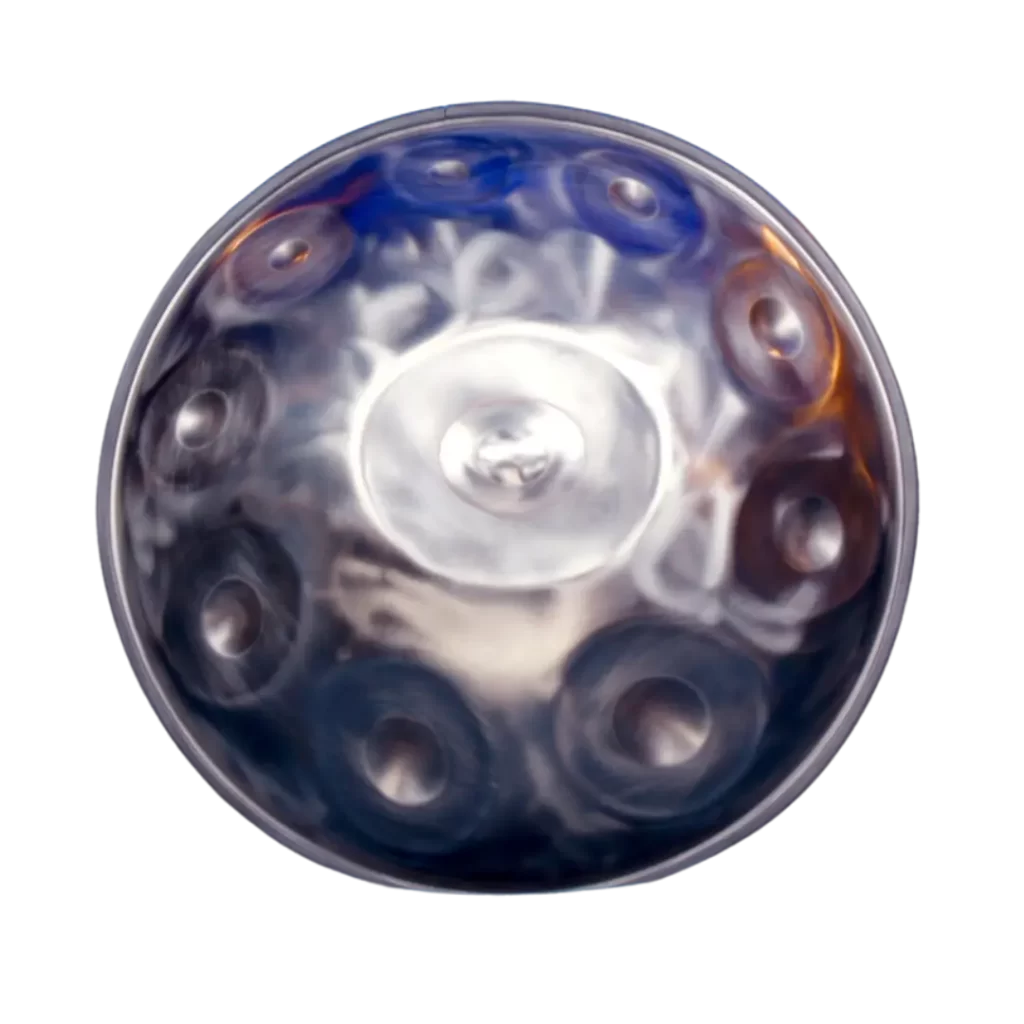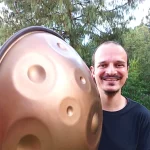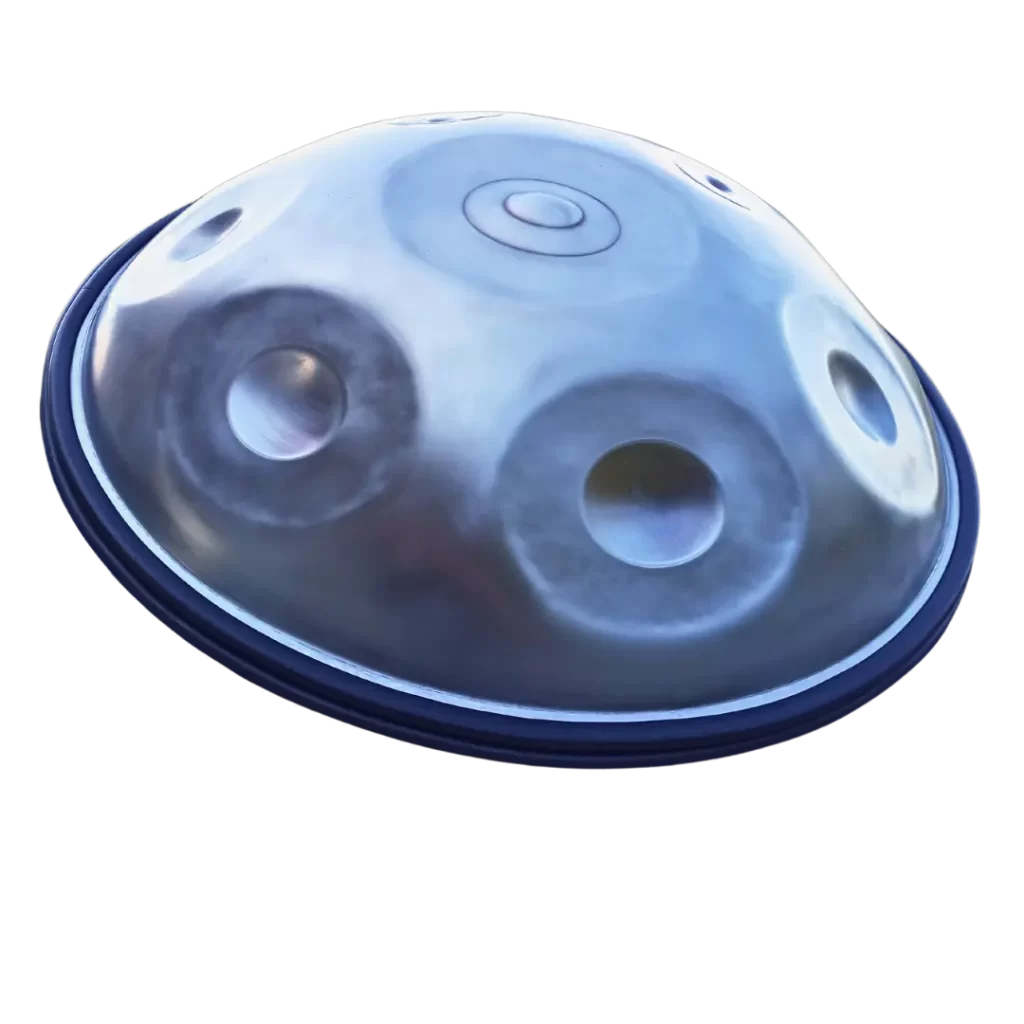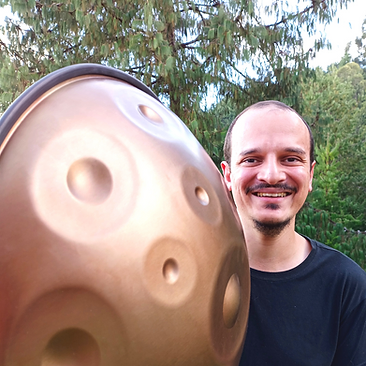






A unique and unforgettable
sound experience.
Our journey began in 2015, driven by the ambition to redefine the handpan market. Since then, every note has been shaped with passion and innovation.
In 2017, we expanded our horizons by replacing the traditional with the extraordinary: stainless steel. We transform this material into melodies, improving their sound so that they vibrate delicately and offer a soft tone, like a velvety touch.
For us, shaping stainless steel is an art form, a never-ending quest for sonic excellence. Choosing a Tacta is more than purchasing an instrument; is to immerse yourself in an incomparable listening experience, where each note reflects our artisanal dedication. Our goal is to provide more than a handpan; is to offer a unique musical experience.
Listen - Regular scales
Tacta Handpans offers a catalogue of regular scales. Theses scales are available with reduced waiting time - possibly ready for immediate purchase. For information on availabilty and prices, send us an e-mail.
Custom-made scales
For custom-made scales please send us an e-mail with your request. Whenever possible, the team take orders for different and personalized scales, if viable within the “Tacta standards” of production. For custom-made instruments, building time and wait list is different, and is informed after the initial customization discussion.
FAQ
Frequently asked questions
How do I order my instrument?
You can listen to some of the models we make on our website and choose your favorite. Then just send an e-mail to info@tactahandpans.com with your order. In this e-mail, you will receive all the information about prices, deadlines and delivery methods. And if you want a customized model, different from the ones on the site, you can also contact Rafael, our maker, through the same e-mail, and he will help you create the ideal instrument for you.
Does Tacta Handpan have a physical store?
No, we don’t have a physical store. Tacta Handpans is a manufacturing workshop located in Campos do Jordão – SP, where we craft our instruments by hand. Our sales are made exclusively online. However, we can occasionally schedule visits to the workshop, so that customers can get to know our work and define the details of their order.
What is a Tacta handpan made of?
Our instruments are made of stainless steel, a material that offers excellent sound, as well as being resistant and easy to maintain. To protect the edges of the instrument (where the two shells are glued together), we use a rubber profile. It is removable, which makes the handpan easier to clean and maintain.
What size is a Tacta handpan? Can I choose the diameter of my instrument?
Tacta handpans have an internal diameter of 21 inches. This is the standard size of our instruments, and it is not possible to change it, as it depends on our manufacturing process. We use shells that already come in the exact diameter from the factory, and to shape and tune the notes, we use a fixed-size machine. But don’t worry: people of all sizes and ages, including children, can play our handpans without any problems!
Can I create a completely customized scale for my instrument or does Tacta have a list of predefined scales?
We have several regular scales that you can check out on our website, ranging from 9 to 22 notes. These scales tend to meet the needs and preferences of all kinds of musicians, from beginners, to professionals who need a more complete instrument with more notes. Within Tacta’s standards, it is possible to make some changes and customizations to the scales, but this needs to be discussed with Rafael, our maker, by email. Although it is possible to make some customizations, it is not possible to create a totally personalized scale, as this depends on the manufacturing process and the shape and size of the handpan.
Can I play with mallets?
We recommend you don’t use mallets to play your handpan, as it will cause the instrument to detune much faster. Mallets can also damage the surface of your Tacta.
Can I travel with my instrument? How can I take it on a plane, for example?
Yes, you can travel with your handpan without any problems! We send your instrument with a protective shell and a bag with handles, which makes it easy to carry. You can carry your instrument like a backpack, and the weight will vary according to the protection you choose: the bag and handpan alone weigh an average of 12 lbs; with a protective shell, 16,5 lbs; and with two protective shells 22 lbs. When traveling by plane, you have two options: check your instrument in – in this case, use the protective metal shells and put “fragile” stickers on the bag – or take the handpan in the cabin as hand luggage. The instrument inside the bag usually fits perfectly in the carry-on compartments of larger planes.
Do Tacta handpans always have the same color or are there different colors? Can I paint the surface of my handpan?
Tacta instruments have a silver color, which we call “Ithil”. This color is natural to stainless steel, and the finishing is the result of the manufacturing process and the treatment we give the surface of the material. We do not use any paint or pigments on our handpans. We do not recommend that you paint or alter the surface of your instrument, as this can affect the sound quality and material properties.
How should I maintain my instrument on a daily basis? Can I get it wet, take it to the beach? What should I do if it gets dirty?
To keep your Tacta clean and protected, follow these tips:
After each use, wipe the surface of the instrument with a dry, soft, lint-free cloth.
Periodically (the frequency depends on how much you play), apply a thin layer of protective wax, which comes with your basic maintenance kit, along with two microfiber cloths.
Avoid getting your instrument wet, playing on the beach or exposing it to direct sunlight. Stainless steel is tough, but it can suffer from salt spray, sand and excessive heat.
If something falls or splashes on your handpan, remove as much as possible with a paper towel, wipe the surface with rubbing alcohol and then reapply the protective wax.
Will my handpan go out of tune quickly when I start playing it? Can I re-tune it myself?
Don’t worry, your Tacta won’t go out of tune any time soon. We test and check each instrument several times before sending it to you, and our manufacturing process guarantees stable, long-lasting tuning. Of course, over time, like any acoustic instrument, the handpan may need some maintenance. If you take good care of your Tacta, playing it gently, it will be a long time before it needs maintenance. And when it does, you’ll have to send your instrument to our workshop, as only a trained professional can tune it correctly.
What do I do if my instrument falls on the floor, gets dented or damaged in some other way? Is it possible to refurbish it?
We know that accidents happen, which is why we offer a repair and retuning service for handpans that have been damaged. But we have to assess each case individually, as it’s not always possible to fully restore the instrument. That’s why we ask you to send us videos and photos of your damaged handpan by e-mail, or to send us your instrument if possible, so that we can make a more precise analysis. Depending on the situation, the refurbished instrument may be as good as new, but in more serious cases, it might not be possible to restore it to its original functionality.









